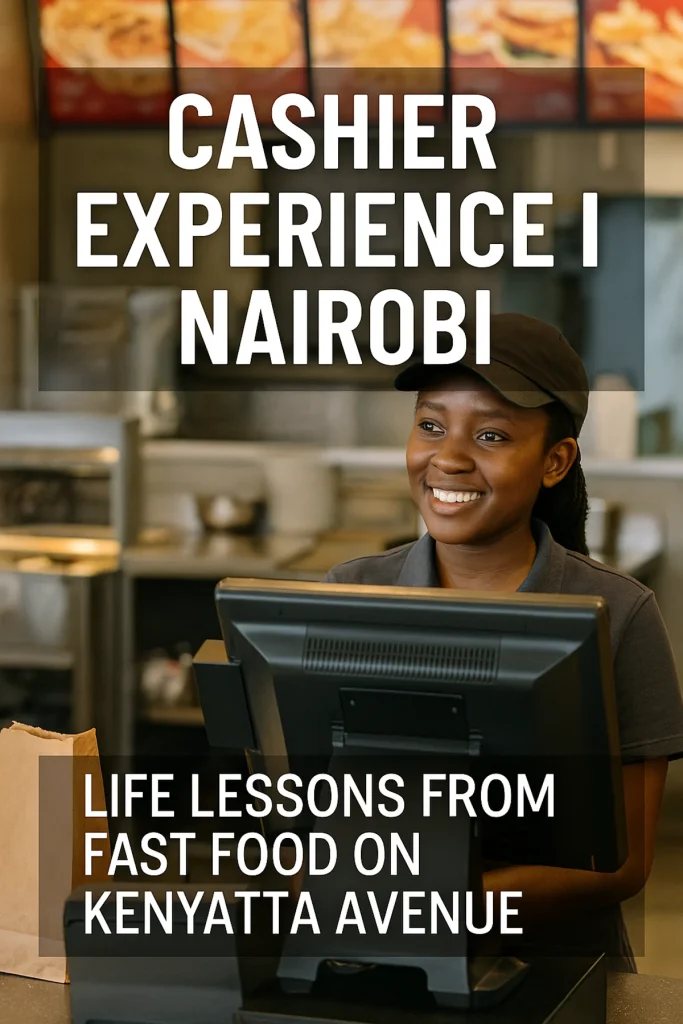
What My Cashier Experience in Nairobi Taught Me
Before I ever wrote a blog post, closed a deal, or signed a contract, I was behind a fast food counter on Kenyatta Avenue—managing chaos with a smile. That cashier experience, right in the heart of Nairobi’s downtown buzz, was more than just a job. It was my boot camp for real-world skills: resilience, discipline, and human connection.
Whether you’re a student eyeing your first job or a professional brushing up your people skills, being a cashier in Nairobi can transform you in ways you don’t expect.
Fast Food and Faster Lessons: My Nairobi Cashier Life
This wasn’t just any fast food spot. One side dished out chips and juice; the other doubled as a restaurant by day and a bar by night. We served everyone—from boda riders to bankers. And in that crowd, I found purpose.
My shift started at 6 a.m. Before the doors opened, I had scrubbed the juice dispensers, wiped down counters, and polished trays to a shine. A single slip—like cold oil or dirty surfaces—could mess up the whole day’s flow. That routine shaped how I view preparation and punctuality today.
There was no room for lateness or shortcuts. Everything had to be clean, stocked, and ready before the day began. And I learned quickly that speed without accuracy created more problems than it solved.
👉 Want to develop stronger customer service skills?
Check out Coursera’s Customer Service Fundamentals Course (outbound link) to strengthen your foundation.
Juggling Coins and Chaos: Money Lessons from the Till
Serving chips wasn’t the only thing I was responsible for. I handled money—and lots of it. Every 3 p.m. handover and 2 a.m. closing tally had to be exact. A till short by just KSh 10 could cost someone their shift.
So I learned fast: double-check receipts, track every coin, and never ignore a gut feeling.
“Handling cash taught me the art of accuracy and calm under pressure—skills I still use in my business today.”
We didn’t have fancy point-of-sale systems—just handwritten receipts, calculators, and a physical till. I kept a mental log of frequent orders, and sometimes had to recalculate things when someone changed their mind after payment. It was tiring but sharpening.
Now, I still track my finances with a simple money ledger notebook (affiliate link). It’s a small habit that began back then and continues to guide me.
Customer Service Under Fire: Navigating Nairobi Moods
If you’ve served food in Nairobi, you know—patience is not always on the menu.
Delays, heat, stress… even a simple line can spark tension.
One day, a customer shouted:
“Wewe! Change yangu iko wapi?”
My hands trembled, but I smiled, showed the receipt, and handed back the exact coins. He left grumbling—but didn’t come back yelling.
Some customers skipped queues. Others demanded extra sauce for free. A few tried to confuse me during payment. I learned to hold my ground—firm, but respectful.
That fine balance—between calm and assertiveness—is something I’ve carried into every interaction since.
Also read: Handling Unstable Customers in Customer Care – Kenya
Nairobi Nights and Human Stories
Night shifts brought a new energy. The outlet turned into a buzzing pub, and the clientele changed too.
Some patrons were drunk. Others lonely. Some just wanted a samosa and a seat. But once in a while, someone would open up—sharing heartbreaks, work pressure, or silent battles.
I remember a middle-aged man who always came alone and sat at the corner booth with a plate of chips and two beers. He never spoke much—until one night, he told me about losing his job after 20 years in the same company.
“That job taught me empathy more than any motivational quote ever could.”
Serving people after dark showed me that everyone—corporate executives, boda riders, night nurses—carry stories. I just happened to hear them at the counter.
👉 Want to build more empathy in your work?
Explore The Art of Empathy by Karla McLaren —a guide I wish I had during those shifts.
The Power of Aprons and Attention to Detail
You’d be surprised how many customers notice the small things.
“You’re cleaner than the other place,” one customer once told me.
Clean counters. A neat apron. Tidy hair. These tiny details made people trust the service—and often tipped better too.
“The way you do anything is how you do everything.”
That mindset still drives my work today—from blog formatting to freelance deliverables.
Even now, I double-check emails, tidy up my desk before Zoom calls, and take care with packaging when delivering books or deras. It’s the little things that make people remember you—and refer you.
Final Reflections: Beyond the Chips and Juice
I remember one night I got home too tired to eat. I fell asleep still wearing my apron. But I woke up with more than just aching feet.
That cashier experience in Nairobi gave me more than money.
It gave me work ethic.
It gave me empathy.
It gave me discipline.
It gave me grit.
And most importantly, it gave me stories—real, raw human stories that continue to shape my writing, business, and how I show up for others.
Your Turn: What Did Your Cashier Experience Teach You?
Have you worked the till before—in Nairobi or elsewhere?
Did it teach you something that stuck with you?
💬 Share your story in the comments. I’d love to hear it.
📩 Want more real-life reflections like this?
Subscribe to the blog at lobbyreflections.co.ke and get weekly insights on work, growth, and mindset.
🛒 Some product links in this post are affiliate links. As an Amazon Associate, I earn from qualifying purchases—at no extra cost to you.
📌 Know someone working a cashier job today?
Share this post. They’re gaining more than they know.
Leave a Reply